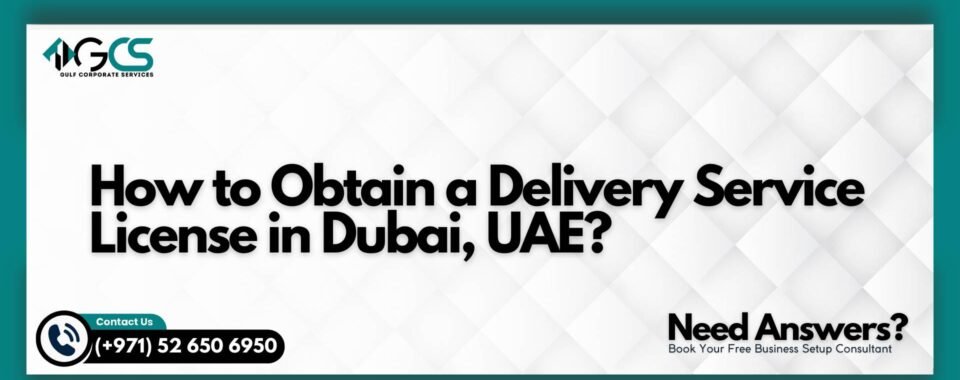
Dubai has firmly established itself as a tech-forward city with an on-demand economy that continues to thrive. From food deliveries to e-commerce parcels, the demand for fast and reliable logistics has skyrocketed. For entrepreneurs, this growth opens the door to launching a successful delivery service business. But before hitting the roads, one critical step awaits—getting your Delivery Service License in Dubai, UAE.
This guide walks you through everything you need to know, from setup to compliance, so you can operate smoothly and legally in one of the most promising logistics markets in the region.
Why Start a Delivery Business in Dubai?
Dubai’s pace of life is fast, and consumer expectations are high. Most people now prefer doorstep deliveries—whether it’s groceries, gadgets, or lunch. That convenience-driven mindset fuels the growth of logistics businesses in the city.
E-Commerce Boom
The UAE’s e-commerce industry is booming, with billions of dollars in projected revenue over the next few years. Delivery services are essential in connecting online retailers with customers efficiently.
Supportive Infrastructure
Dubai offers world-class roads, intelligent traffic systems, and seamless connectivity. This makes it easy to manage delivery routes, vehicle fleets, and operational logistics.
Scalable Business Model
From a solo delivery rider to a fleet of vans, you can start small and grow quickly. The business model is flexible and suited for entrepreneurs of all sizes.
Understanding the Delivery Service License
A Delivery Service License in Dubai, UAE is a legal authorization issued by the Department of Economic Development (DED) or a Free Zone authority. This license allows a business to engage in various forms of logistics and delivery, including:
- Food and restaurant delivery
- Parcel and courier services
- E-commerce and retail logistics
- Last-mile delivery services
Depending on your offerings, additional permits may be needed from government departments like Dubai Municipality or the Roads and Transport Authority (RTA).
Steps to Obtain Delivery Service License
Starting your delivery company doesn’t have to be complicated if you follow the process correctly. Here’s a simple breakdown of what to expect:
Step 1: Choose Your Business Jurisdiction
Decide whether to set up on the Dubai mainland or in a Free Zone. Mainland gives you access to the entire UAE market, while Free Zones offer benefits like full foreign ownership.
Step 2: Select the Right Business Activity
Choose your business activity from the official list—common ones include courier services, logistics, and delivery operations. This affects your licensing process and permissions.
Step 3: Pick a Legal Structure
The most common choice is a Limited Liability Company (LLC), but you can also register as a sole proprietor or a civil company depending on your scope and investment.
Step 4: Register a Trade Name
Your business name should be unique and align with your services. Make sure it follows Dubai’s naming rules and is approved by the DED or the relevant Free Zone.
Step 5: Apply for Initial Approval
Submit a request for initial approval to confirm that you’re permitted to operate under your selected activity and structure.
Step 6: Prepare and Submit Documents
Typical documents include:
- Shareholders’ passport copies
- Emirates ID (if applicable)
- UAE residence visa (if applicable)
- Drafted MoA (Memorandum of Association)
- Lease agreement or Ejari for office space
Some Free Zones may also ask for a basic business plan.
Step 7: Secure Office Space
Whether you’re renting a desk in a business center or leasing a full warehouse, you need a physical address to register your business.
Step 8: Pay Fees and Receive Your License
Once your documents are verified, and the application is approved, pay the license fees. You’ll then receive your official Delivery Service License in Dubai, UAE, allowing you to legally start operations.
Step 9: Apply for Additional Permits
Depending on the nature of your business, you may need extra approvals:
- RTA permits for vehicles used in delivery
- Dubai Municipality clearance for food-related logistics
- Civil Defense approval for logistics or storage facilities
Cost of Delivery Service License in Dubai
While the exact fees depend on various factors, here’s a general idea:
- Mainland license: AED 12,000 – AED 18,000
- Free Zone license: AED 10,000 – AED 20,000
Other expenses may include:
- Visa processing
- Vehicle registration
- Fleet insurance
- Commercial lease or warehouse rental
Working with a business setup expert can help you estimate and minimize costs efficiently.
Legal Compliance Requirements
To operate legally and professionally, certain regulations must be followed:
Insurance Coverage
All delivery vehicles and employees must be covered by appropriate insurance policies, especially for food or high-value goods.
RTA Vehicle Standards
Delivery vehicles must meet RTA safety and functionality standards. Food delivery vehicles, for instance, may require proper insulation or temperature control.
Driver Requirements
Every driver should have:
- A valid UAE driver’s license
- Employment visa under your company
- Health clearance (mandatory for food handlers)
Advantages of Starting a Delivery Business in Dubai
Launching a delivery company comes with many benefits:
100% Foreign Ownership in Free Zones
You don’t need a local partner to get started in many Free Zones, making it easier to retain full control of your business.
Attractive Tax Policies
There’s no personal income tax, and small businesses benefit from straightforward VAT registration and compliance.
Expansive Market Access
With a delivery license, you can serve not only Dubai but expand to the entire UAE and even reach international markets through logistics partnerships.
Government Support
Dubai’s smart government platforms make it easy to register, apply for permits, and manage compliance all from one place.
Common Challenges (And How to Handle Them)
Like any business, delivery services come with hurdles—but they can be managed:
Finding Skilled Drivers
Recruit drivers with experience and offer them attractive incentives like bonuses for on-time deliveries or fuel allowances.
Intense Competition
Focus on exceptional customer service, real-time updates, and flexible delivery times to differentiate your company.
High Operational Costs
Start lean. Rent vehicles instead of buying, use shared warehouses, and manage shifts to optimize fuel and time.
Conclusion
Launching a delivery service in Dubai has never been more timely—or more achievable. The demand is real, the systems are in place, and the support from the government is substantial. All you need is the right planning and legal structure to get your Delivery Service License in Dubai, UAE, and you’re ready to operate.
Whether you’re entering the food delivery space, parcel logistics, or last-mile e-commerce solutions, Dubai offers the infrastructure, market, and growth potential to turn your vision into reality. With the right approach, you can build a reliable, scalable, and profitable delivery business that meets the growing needs of modern consumers across the UAE.








